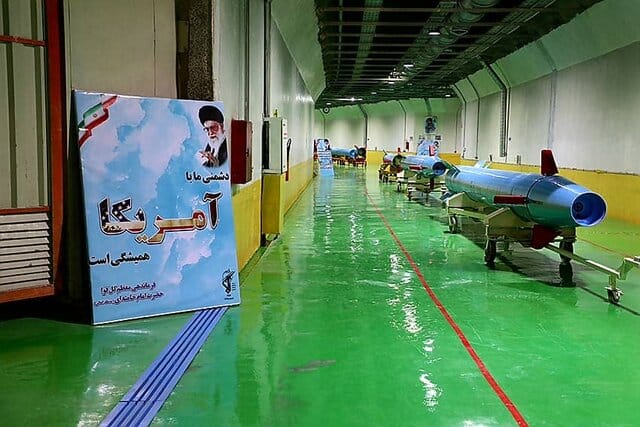No deal with Tehran’s tyranny
Iran's development of intercontinental ballistic missiles points to a much broader agenda: The ability to threaten the world far beyond the Middle East.
By Ronen Itsik
JNS
Jun 20, 2025
A subterranean Iranian SRBM assembly line with a poster (left) quoting Iran’s Supreme Leader Ali Khamenei as saying, “Our enmity with America is eternal.”
The question confronting the United States on whether to actively support Israel’s campaign against Iran’s nuclear ambitions is legitimate and deeply complex. From Washington’s perspective, remaining on the sidelines may preserve America’s diplomatic credibility in future negotiations. It also aligns with the instincts of the Republican-led administration, and President Donald Trump in particular, who has long championed ending America’s foreign entanglements, not expanding them.
But the Iranian case is not a conventional one. This is not a question of regional power rivalry or geopolitical posturing. Iran, under the leadership of the ayatollahs, represents a violent theocratic ideology, not just a regime. For decades, Tehran has fueled instability across the Middle East, propping up armed proxies, spreading revolutionary extremism and investing heavily in weapons of mass destruction—all while benefiting from the patience and, at times, appeasement of the international community.
Iran’s ambitions are global. Its continued development of intercontinental ballistic missiles—without a plausible defensive justification—points to a much broader agenda: The ability to threaten the world far beyond the Middle East. These weapons are not built to defend Iran. They are designed to give cover to a growing network of terrorist militias, already active from Yemen to Lebanon and from Iraq to Europe. Iranian operatives have plotted attacks in France, Germany, Bulgaria and Turkey, all under the guise of a revolutionary religious doctrine endorsed at the highest level.
This is not a regime guided by the logic of Western diplomacy. It is a cunning actor that manipulates negotiations to buy time, build capacity and continue its global subversion. It does not simply oppose the United States and Israel; It seeks their destruction. That ambition is not rhetorical; it is strategic and operational.
Israel, as the most immediate target, faces an existential dilemma. Unlike larger nations, it cannot absorb a nuclear strike. And it cannot ignore the mounting threats from Hezbollah, Islamic Jihad and the Islamic Revolutionary Guard Corps. When Iran’s Supreme Leader Ali Khamenei openly speaks of a countdown to Israel’s destruction, Israelis are compelled to act—not by choice, but by necessity.
This is not merely Israel’s war. The regime in Tehran poses a real, long-term threat to the free world. To entertain the idea of a new “deal,” one that preserves the current regime in exchange for unverifiable promises, is to play with fire. Worse, it is to feed a wounded beast. History teaches us that appeasing radical regimes does not prevent wars. It invites them.
Whether or not the United States joins Israel’s military effort is, ultimately, a sovereign decision. But make no mistake: The American flag will continue to burn in Tehran regardless. In the eyes of the Iranian regime, America is the great enemy because it symbolizes everything they seek to destroy: liberty, individual rights, democracy and the rule of law.
The real question facing the United States is not whether to partner in Israel’s campaign, but whether to stand by while a tyrannical regime continues its march against the free world.
Toppling the regime in Tehran would not start a new war; It would bring an end to a decades-long conflict waged through proxies, bombs, cyberattacks and ideological warfare. This is not about empire-building or regime-change adventurism. This is about survival.
Eighty years ago, America confronted absolute evil and saved the free world. Today, the same moral challenge confronts the world. The ayatollahs’ regime has proven, through action as well as rhetoric, that it belongs to the dark side of history. But unlike the movies, this is not a galaxy far, far away. This is our world.
And it’s time to protect it.

No comments:
Post a Comment